|
Today is the finals of the Australian Open, and tomorrow is the Iowa Caucus, both of which bring us naturally to Lewis Carroll. Yes, the man who created Wonderland was interested in both lawn tennis and in elections. He wanted to make them both fairer, more logical, more mathematically perfect. Carroll was compelled to write about the rules of lawn tennis tournaments after talking to an acquaintance who was upset after he lost in the first round and then saw a player much weaker than himself make his way into the finals. Of course, they didn’t have seeding back then. Draws were composed randomly, so the best and second best players could very easily meet in the first round. Carroll offered his solution in his pamphlet named, “Lawn Tennis Tournaments, The True Method of Assigning Prizes with a Proof of the Fallacy of the Present Method.” Importantly, he did not propose a seeding system like we use today. That would have been too simple. Instead, he created a complex tournament structure in which players could not be eliminated in the first round. Loosers kept playing until they had three superiors, three people who had beaten them or beaten someone who had beaten them. I am a bit of a tennis fanatic and play in a USTA League and I am now dying to set up a tournament using Carroll’s scheme. What should we call it? The mad tea party tournament? Or perhaps the completely fair and logical Reverend Charles Lutwidge Dodgson Tournament. Here is an article by Rachel Bachman from the Wall Street Journal about Carroll’s tournament format: http://www.wsj.com/articles/SB10001424052702304636404577297821444746352. I am much indebted to it for explaining his complex system. Carroll’s obsession with fairness also took him into the arena of elections. He wrote three pamphlets about elections. He was upset not just by unfairness in national elections, but also by unfairness in Oxford University elections. Imagine a university with an unfair system! Here is an article by Glenn C. Joy entitled “Ballots in the Belfry: Lewis Carroll and Voting Fairness”: file:///C:/Users/Owner/Downloads/NMWT_2002_Joy_BallotsInTheBelfryLewisCar.pdf . 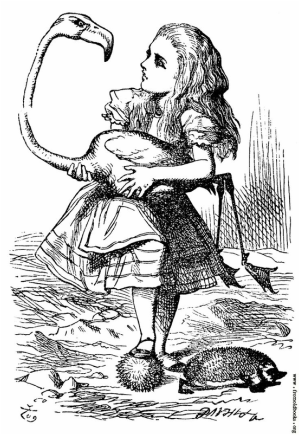 Wonderland is full of games that are immensely unfair and illogical. Take the croquet game, which is played on an uneven turf and uses live creatures for balls and mallets. Carroll explains through Alice’s point of view: Alice thought she had never seen such a curious croquet-ground in her life: it was all ridges and furrows: the croquet balls were live hedgehogs, and the mallets live flamingoes, and the soldiers had to double themselves up and stand on their hands and feet, to make the arches. The live creatures make it a game of random chance rather than skill. They also make it wonderfully loopy and fun and imaginative. Could Carroll be mocking here a Victorian game that is a bit staid and stuffy? He wants rules that are fair and that work, but he also loves defying rules and logic. Alice says to the Cheshire Cat: “I don’t think they play at all fairly,” Alice began, in rather a complaining tone, “and they all quarrel so dreadfully one ca’n’t hear oneself speak—and they don’t seem to have any rules in particular: at least, if there are, nobody attends to them—and you’ve no idea how confusing it is all the things being alive: for instance, there’s the arch I’ve got to go through next walking about at the other end of the ground—and I should have croqueted the Queen’s hedgehog just now, only it ran away when it saw mine coming.” On the one hand, I hear in Alice’s petulance Lewis Carroll’s frustration with a world that does not work logically. He was, after all, a logician. On the other hand, how much more fun and wondrous is a game with live creatures than a game with plain wooden sticks and wire wickets? Just look at this picture of a real Victorian croquet game. It is not at all inspiring. I am indebted to Alice Medinger for reminding me of the Caucus Race and its connection to American politics in her beautifully illustrated blog post: https://medinger.wordpress.com/2016/01/26/lewis-carrolls-caucus-race/.
The caucus race is another illogical and unfair game. Again, the course is uneven and the rules are unclear. First it [the Dodo] marked out a race-course, in a sort of circle, (“the exact shape doesn’t matter,” it said,) and then all the party were placed along the course, here and there. There was no “One, two three, and away!” but they began running when they liked, so that it was not easy to know when the race was over. What on earth would Carroll have made of this year’s Iowa caucuses? In Alice in Wonderland, when everyone asks the Dodo who has won the caucus race, he says: “Everybody has won, and all must have prizes.” What if the election in Iowa doesn’t eliminate any candidates? What if everyone wins and keeps running around in “a sort of circle” endlessly? It feels as though this has already happened. Carroll was eerily prescient.
21 Comments
http://www.nytimes.com/2015/10/12/opinion/the-importance-of-recreational-math.html?_r=0 It’s funny for me to be writing a blog post in response to an article about recreational math. I am after all the most mathematically challenged person in the universe. My children realized by about fourth grade that they had already surpassed me. When students ask what they need to make on a test to get an A in my class, I tell them they will have to do that math themselves. But enough about my math challenges. I was surprised to see in the article the name Martin Gardner and to discover that he was famous in the math world for creating elaborate puzzles. I, of course, know Martin Gardner as the editor of the annotated Alice in Wonderland. And it makes perfect sense that as a mathematician, Martin Gardner would be interested in Lewis Carroll. Lewis Carroll taught mathematics and logic at Oxford.
But the more important connection between Gardner and Carroll is their love of puzzles and play, their belief that learning should be fun. Perhaps if I had played more mathematical games, I would have less trouble now adding up my students’ grades. And I certainly hope, as the article suggests, that recreational mathematics will find a place in the Common Core. In the early hours of the morning of May 22, 1867 Charles Dodgson worked feverishly on a one-hundred line poem that opposed the Vice-Chancellor of Oxford’s Decree of April 29 calling for the conversion of a park in North Oxford into a cricket pitch. The poem he wrote is a parody of Oliver Goldsmith’s “The Deserted Village” (1770). It should not surprise us that Dodgson framed his protest in this parodic form, but why did he care, what did he have against the sport of cricket, and what can we learn from this controversy about his conception of childhood? First of all, he laments the artificial levelling of the naturally rolling grounds of the park. Adown thy glades, all sacrificed to cricket, Thy hollow-sounding bat now guards the wicket; Sunk are thy mounds in shapeless level all, Lest aught impede the swiftly rolling ball; And trembling, shrinking from the fatal blow, Far, far away thy hapless children go. The destruction of this natural space has displaced its natural inhabitants, children. In the romantic tradition, Dodgson identifies children here as a part of nature and as vulnerable to Victorian “progress.” But the children he describes are not privileged drawing room children like Alice Liddell, daughter of the Dean of Christ Church College, but “urchins.” He deplores the loss of the “charms” belonging to, The never-failing brawl, the busy mill Where tiny urchins vied in fistic skill-- (Two phrases only have that dusky race Caught from the learned influence of the place; Phrases in their simplicity sublime, “Scramble a copper!” “Please, Sir, what’s the time?”) These round thy walks their cheerful influence shed; These were they charms—but all these charms are fled. A man of his age and an essentialist, Dodgson conflates race and class when he refers to the unwashed, coal smudged children as “that dusky race.” But more importantly he idealizes the freedom of the brawling, fighting “urchins” whom he considers much closer to nature than the drawing room child. This idealization helps to explain why he photographed Alice barefoot dressed as a beggar. Supervised by her governess, Miss Prickett, and shuffled between lessons and fittings by her ambitious mother, Alice could only pretend to be a child of nature.
Of course it is deeply problematic to idealize and prettify childhood poverty, but Dodgson was on to something in opposing the overly structured lives of middle and upper class Victorian children. In a letter to May Forshall, one of his child friends, he wrote: “Do you ever play at games? Or is your idea of life “breakfast, lessons, dinner, lessons, tea, lessons, bed, lessons, breakfast, lessons,” and so on? It is a very neat plan of life and almost as interesting as being a sewing machine or a coffee grinder.” Just the word coffee grinder evokes images of Dickens’ Mr. Gradgrind stuffing facts down little childrens’ throats and destroying their imaginations. When he asks Miss Forshall if she plays at “games,” Dodgson does not mean exclusive, organized sports like cricket, which he associates with wealth and privilege. Ill fares the place, to luxury a prey, Where wealth accumulates, and minds decay; Athletic sports may flourish or may fade, Fashion may make them, even as it has made; But the broad Parks, the city’s joy and pride, When once destroyed can never be supplied! Rather he means the kind of imaginative games that children invent on their own, games without “pavilions” and “scorers’ tents,” games without winners and losers, games without complicated and absurd rules. Dodgson was obsessed with childhood and children because they represented for him freedom from the oppressive constraints of Victorian life. They represented freedom from finicky indoor spaces, freedom from ticking wristwatches, freedom from attention to manners and dress, and finally freedom from the burdens of his academic work. |
Caroline McAlisterCaroline is an avid reader, children's writer, and teacher. She lives in North Carolina with her husband and dog. Check out her bio for more! Archives
February 2024
Categories
All
|
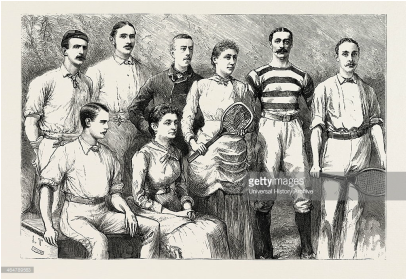
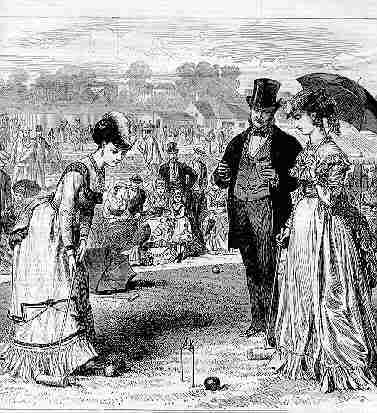
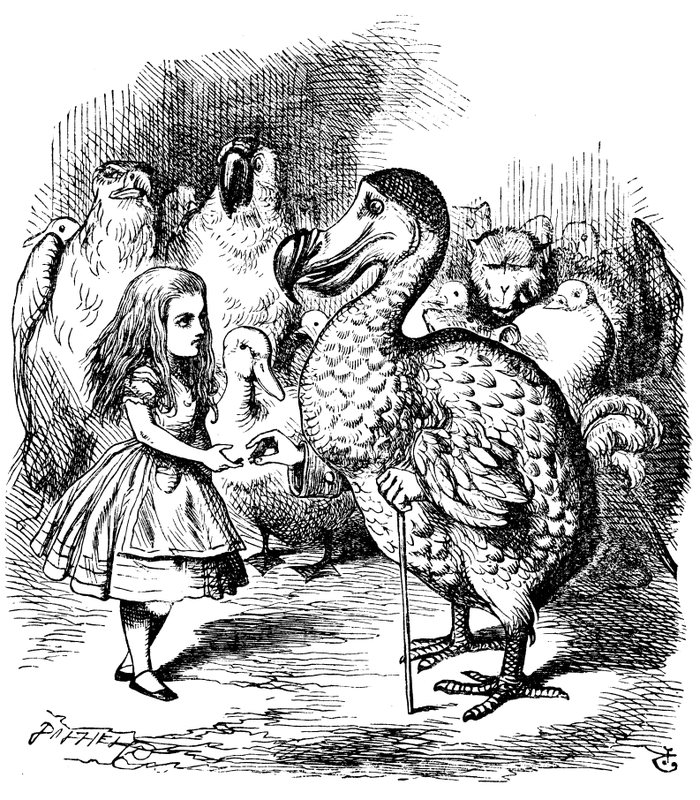
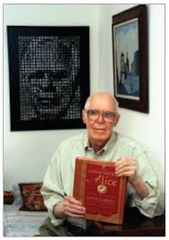

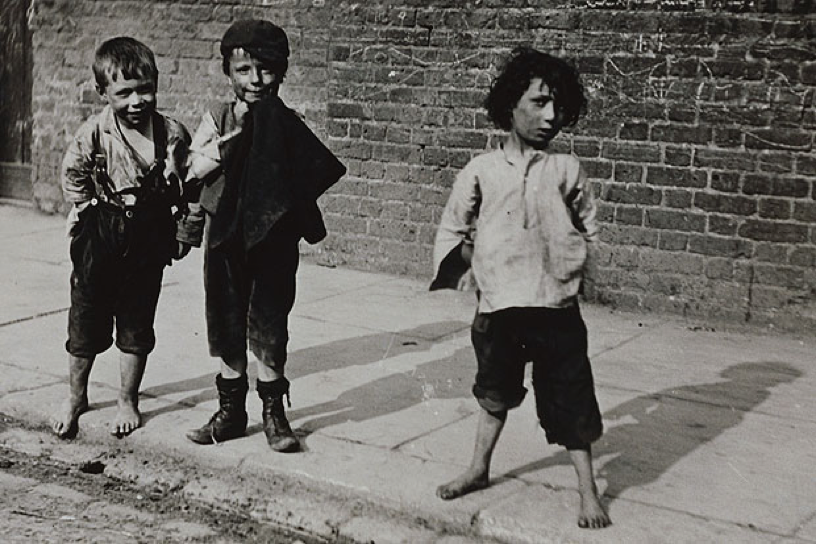
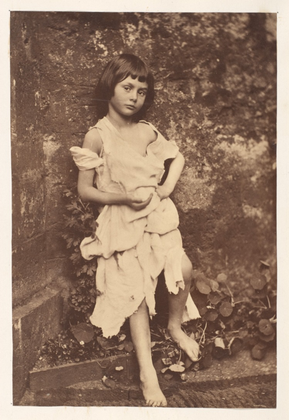
 RSS Feed
RSS Feed